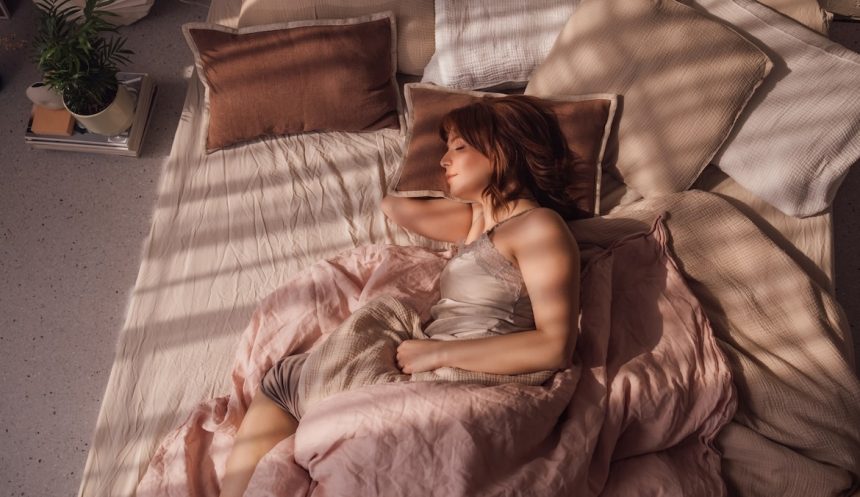It happens every night like clockwork: You fall asleep feeling comfortable and cool, but wake up every two hours or so kicking off your covers. Before you know it, you’re in a full night sweat, and you’re not exactly sure why.
Turns out, there are *so* many potential answers to the question “why do I get so hot when I sleep?” In most cases, feeling a little warm in the middle of the night is normal. Your core body temperature fluctuates throughout the day and “starts to dip at night” to prep your body for sleep, says Thomas Kilkenny, DO, director of the Institute of Sleep Medicine at Northwell Staten Island University Hospital. But in order to let off heat, blood vessels in your skin will dilate, causing your skin temperature to rise, Dr. Kilkenny says. This process might make you feel a little toasty, at least temporarily, before the heat escapes your body.
Cooling off by shedding some layers (i.e., taking off blankets or your socks) can be a great quick fix. But if you’re consistently waking up with sweat-soaked sheets, an underlying health or lifestyle issue may be to blame. Addressing the problem will not only keep you cool, but can also help you get more quality sleep. Read on to learn the most common reasons why you’re a hot sleeper, how to stay cool throughout the night, and when to see a doctor if it’s sabotaging your slumber.
Related Stories
-
It’s your sleep environment
Sweating bullets when you sleep? It might be the room you’re sleeping in. The following factors can play a role in overheating while sleeping, per Dr. Kilkenny:
- Hot or humid climate: “Hot weather and warmer, humid rooms may prevent the body from cooling down,” Dr. Kilkenny says. “The best temperature for sleep is 65 to 68 degrees Fahrenheit,” he adds.
- Heavy bedding: “Some sheet and blanket materials are designed to hold heat, causing us to feel warm,” he says.
- Warm pillows, mattresses, and mattress toppers: “Also think about the type of mattress and mattress topper,” he says. “Foam mattresses or toppers hold the heat more and do not allow the skin to breathe.”
- Heavy pajamas: If your PJs are thick or made of unbreathable materials (like fleece or wool), they can insulate heat.
- Sleeping partners and pets in the bed: Warm-blooded beings—like humans, dogs, and cats—radiate so much heat at night.
-
Your body’s more sensitive to heat
Your body composition can make you more sensitive to heat. For example, people with a higher percentage of body fat may feel hotter at night. Dr. Kilkenny says having overweight causes us to feel warm. That’s because when “blood vessels are insulated by fat cells,” it limits the “ability to lose heat into the environment,” he adds.
-
You take certain medications
The meds you’re taking could also be responsible for nighttime perspiration. Certain drugs, especially antidepressants, “can cause people to feel hot and lead to excessive sweating,” Dr. Kilkenny says. But antidepressants aren’t the only drugs with sweaty side effects.
-
You could have a sleep disorder
Chronic overheating at night could also be a sign of a sleep disorder. “Obstructive sleep apnea, especially, and other sleeping disorders can disrupt sleep and at times cause a struggle to breathe at night,” Dr. Kilkenny says.
-
You deal with neuropathy (aka, nerve damage)
According to Dr. Kilkenny, chronically damaged nerves in your body (also known as neuropathy) can cause heat intolerance, sweating (or sometimes, not being able to sweat), and a burning sensation in your arms and legs. Neuropathy symptoms can vary depending on the type of nerves that are affected.
-
You have another underlying health condition
Besides neuropathy and sleep disorders like sleep apnea, a whole host of other health issues may make you more sensitive to heat. These include various medical issues such as cystic fibrosis, diabetes, cardiovascular disease, and menopause.
-
You’re working up a sweat too close to bedtime
Any type of vigorous activity—from exercise to sex—can spike your body temperature, Dr. Kilkenny says. And if you build up a sweat right before you hit the hay, your body might need some time to cool down.
-
You drank caffeine too close to bedtime
We’ve all likely heard that drinking coffee too late in the day can be overstimulating and mess with your sleep that night. But turns out, a cup of joe close to bedtime can make you feel too hot to sleep.






